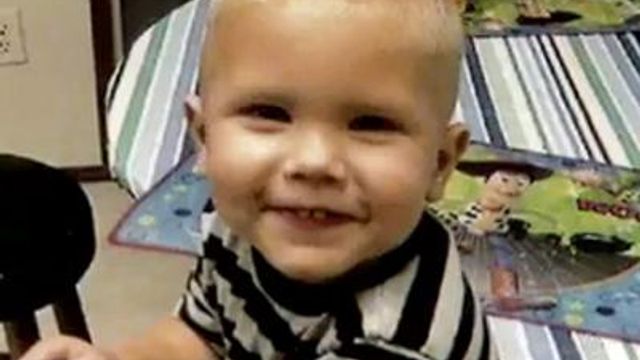'Mama, I'm going to die': Mother shares domestic violence story
"Mama, I'm going to die tonight." Those were the last words Christie Adams heard her 3-year-old son Jesse say before her estranged husband shot the boy and then turned the gun on himself on July 13, 2012.
Posted — UpdatedListening helplessly on the phone as her son cried, Adams told Jesse she loved him before hearing a gunshot. She called 911 and rushed to her estranged husband’s home on Wiley Gaskins Road in Grifton, hoping her son might still be alive.
“How do you know he has a gun to your son’s head?” the 911 dispatcher asked.
“He said that my son is already dead and he’s getting ready to send me a picture. He made my son tell me that he was going to die,” Adams told the dispatcher.
Barely able to breathe, Christie Adams sat outside and waited while authorities searched Carey "C.J." Adams’ home.
“I was hyperventilating,” she said. “I was sitting there hoping and praying that the deputy was going to bring my baby out to me, but it didn’t happen … My whole world ended right then.”
Christie Adams: 'He grabbed me, choked me'
The murder-suicide of C.J. Adams, 34, and his son shocked the small Pitt County community and left investigators traumatized and determined to stop similar violence in the future.
After Jesse’s death, the sheriff’s office applied for and received a federal grant that gives the agency up to $800,000 over the next four years to help prevent domestic violence murders. The money will fund:
- Two investigators to work on domestic violence cases full time
- An advocate at the Family Violence Center who will work with victims
- A researcher at the University of North Carolina at Chapel Hill who can help compile data about domestic violence murders and look for common issues between the cases.
About 54 percent of Pitt County’s murders from 2008 to 2011 were the result of domestic violence – compared with 22 percent statewide – according to the sheriff’s office, and C.J. Adams’ case was no different. Investigators say he was motivated by an ongoing domestic dispute with Jesse’s mother.
“He would always tell me I’m too fat, I’m ugly, I’m stupid,” Christie Adams recalled, saying she tolerated the emotional abuse because C.J. Adams made her believe she was lucky to be with him.
When the emotional abuse turned physical, she took out a restraining order against him.
“He grabbed me, choked me and he beat my head up against a microwave and a furnace,” Christie Adams said. “I constantly walked on eggshells.”
The couple separated four months before the shooting. While she feared for her own safety, Christie Adams says she “never at all” thought her estranged husband would harm their son.
Neighbors told WNCT News last year that C.J. Adams appeared to be a good dad, who often played with his son in the front yard, but investigators saw a very different picture of the father and son.
"It's just very sad what we've had to witness," Pitt County Sheriff Neil Elks told WRAL News the day of the shootings. "Several of our officers are very emotionally upset. I had to send two of them home tonight from what they saw."
C.J. Adams' aunt, Cathy Potter, says both sides of the family are hurting. “We grieve, too," she said. "It's a loss on both sides. It’s a no-win situation. It’s over.”
Domestic violence cases predictable, preventable
Domestic violence murders are predictable and preventable, according to Pitt County sheriff’s detective John Guard, who says about 75 percent of victims are killed after leaving or while in the process of leaving their abusers.
“It is not about the pushing, the shoving, the kicking and the punching. It is all about power and control,” he said. “Absolutely the most dangerous time is when (victims) leave. It's when that offender loses that control that violence sometimes increases in severity and frequency.”
The best way to target the cases, Guard says, is to prevent witness intimidation and to enforce restraining orders early on.
“What I'm hoping for personally, and what we wrote into the grant application, is to find common themes between the homicides, those red flags that we can share with others,” he said. “We're going to target these cases early on.”
Christie Adams says she hopes the grant will save people from her fate.
“There are so many women out there who are right now in my shoes, the shoes I wore a year ago, trying to get out but not knowing where to turn,” she said. “All we can do is try. We can push to prevent it, push to let people know what the consequences are.”
Christie Adams says she is healing herself by helping others. She now volunteers at the Center for Family Violence Prevention in Greenville, the same organization that helped her.
“I promised Jesse he was not going to die in vain, and I’m not going to let that happen,” she said.
Despite losing her son to domestic violence, Christie Adams is grateful she was able to give her son one final message over the phone before he was murdered.
Replay: Detective, victim advocate answer your domestic violence questions
• Credits
Copyright 2024 by Capitol Broadcasting Company. All rights reserved. This material may not be published, broadcast, rewritten or redistributed.






